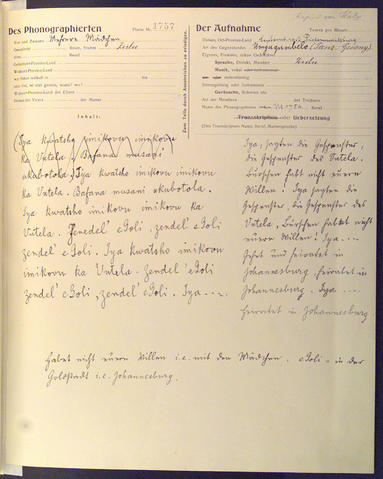Title and statement of responsibility area
Title proper
Umququmbelo: dance song [of the Christian Zulus] Sung by several girls, handwritten protocol
General material designation
- Textual record
Parallel title
Other title information
Title statements of responsibility
Title notes
- Source of title proper: FHYA using ÖAW materials
Level of description
Item
Repository
Reference code
Edition area
Edition statement
Edition statement of responsibility
Class of material specific details area
Statement of scale (cartographic)
Statement of projection (cartographic)
Statement of coordinates (cartographic)
Statement of scale (architectural)
Issuing jurisdiction and denomination (philatelic)
Dates of creation area
Date(s)
Physical description area
Physical description
Publisher's series area
Title proper of publisher's series
Parallel titles of publisher's series
Other title information of publisher's series
Statement of responsibility relating to publisher's series
Numbering within publisher's series
Note on publisher's series
Archival description area
Custodial history
Scope and content
[Source - Carolyn Hamilton for FHYA, 2019, using ÖAW materials: Mayr’s note-taking was sporadic. In his protocols he occasionally gives very few details about some informants, while with others he is quite meticulous. Usually, informants without a first or family name, or informants with names that sound foreign to us, such as Nogwaja, Pakati, Tshingwayo, and Nondhleko, reveal that the person was not a converted Christian, but still a traditional Zulu in the sense that the person adhered to long-established Zulu custom; European-style names such as Frida Kunene and Maria Gertrud(e) Mkize, on the other hand, indicate that these people were Christians. Baptisms were considered successes in the missionary's attempt to "win souls" for the church priorities for the mission. Thus, the baptism registers give some details about those who had decided to change their religion. Typically, when a person was baptised, he or she would take a European name. These names were usually those of European patrons: for example, Fr. Mayr baptised the five-week-old Msomi, Maria Coudenhove, which was the name of the newborn girl's European sponsor. Mlambo, a young man, received the name of his "uncle" or European patron, Franz Rohrmoser (cf. Gütl 2004: 77, 89, 128). The age of the people to be baptised varied from newborn children to elderly people; since most of the latter did not know their birthdays, Mayr was only able to take down estimates of their age into his register (cf. Gütl 2004: 99-100).]
Notes area
Physical condition
Immediate source of acquisition
Arrangement
Language of material
Script of material
Location of originals
Availability of other formats
Restrictions on access
Terms governing use, reproduction, and publication
Creative Commons License: CC BY-NC-ND
https://creativecommons.org/licenses/by-nc-nd/3.0/
Unless otherwise stated the copyright of all material on the FHYA resides with the contributing institution/custodian.
Finding aids
Associated materials
Accruals
General note
Attributions and conjectures
[Source - The Collection of Father Franz Mayr Zulu Recordings 1908, CD booklet, 2006: For some of his recordings, Father Franz Mayr limited his notes on the interlocutors to "grown up (Zulu) girls".]
Alternative identifier(s)
Standard number area
Standard number
Access points
Subject access points
Place access points
Name access points
- Five Hundred Year Archive (FHYA) (Online curation)
- Austrian Academy of Sciences (ÖAW) (Publication)
- Reverend Father Franz Mayr (Collection)
- No attribution (Making)



Material contributed by members of the public
Building an archive is a collective endeavour. Please help us grow the FHYA knowledge base.
If you want to add information to this page you can insert a hyperlink, add files and/or text to the box below.
In the case of material relevant to the FHYA as a whole please upload information HERE.
The FHYA does not vet this material but reserves the right to remove anything deemed to be racist, homophobic, sexist or otherwise offensive. Everything on the FHYA is licensed under a Creative Commons CC BY-NC-ND licence.
To make a contribution you must be a registered user. To register an account, click here. Note that after registration you will not be automatically redirected to this page.
If you have already registered but are not logged in, log in here.